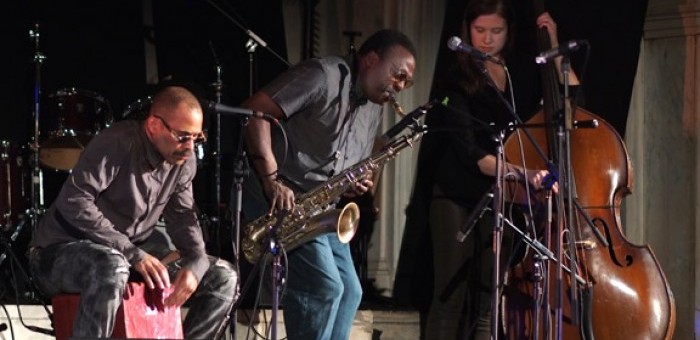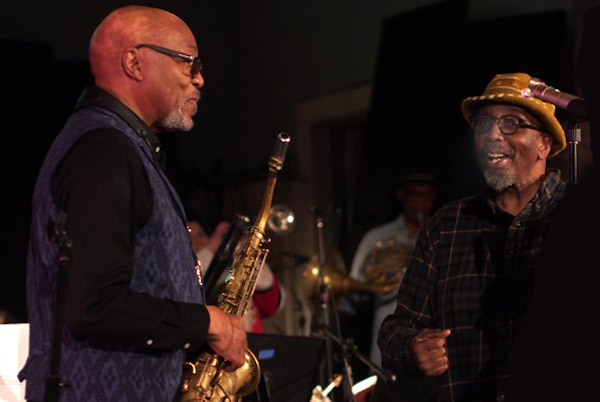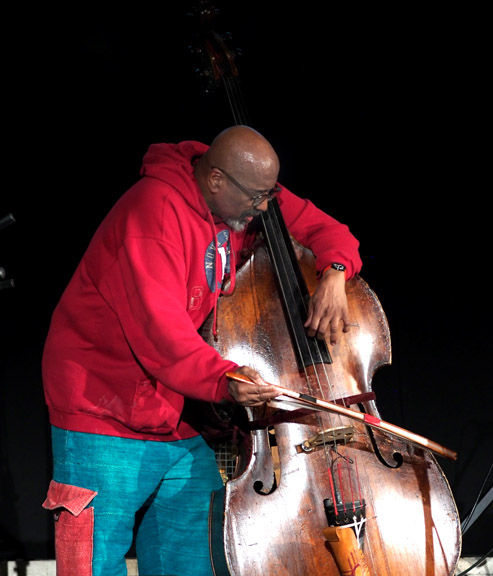Dec 9, 2025 12:28 PM
In Memoriam: Gordon Goodwin, 1954–2025
Gordon Goodwin, an award-winning saxophonist, pianist, bandleader, composer and arranger, died Dec. 8 in Los Angeles.…

Kahil El’Zabar (left), DavidMurray and Carmen Rothwell perform at Vision Fest in New York City on June 3.
(Photo: Michael Wilderman)The 22nd-annual Vision Festival concluded June 3 with a pair of multidisciplinary performances debuting music by Trio 3 saxophonist Oliver Lake and bassist William Parker. Nineteen other musicians and five dancers joined the accomplished composer/musicians at Judson Memorial Church in New York City to perform Lake’s “Justice” and Parker’s “Soliloquy For The Children Who Have Lost Everything And The Flowers That Saved Them.”
“The finale was an idea of mine. I put together the orchestra keeping in mind the acoustics of the room, yet wanting a strong rhythm section and voices,” said Patricia Nicholson Parker, director of Arts for Art, which produces the festival. “Some of the members are regular participants in the Artists for a Free World Marching Band—I thought that spirit would be important for the closing.”
That anthemic vibe was achieved: By the end of the set, the crowd was chanting, “Never forget the people! Freedom Now!” along with the band, turning the performance into something that really felt more like its religious surroundings. Spirits were lifted, and although it was nearing 1 o’clock in the morning, the energy was high. Vision 22 concluded with its most comprehensive display of music, dance, and poetry after a week’s worth of performances from free-jazz and the avant-garde’s finest members.
The Opening Invocation on May 29 featured Patricia Parker—who, in addition to directing and producing the festival, is also an outstanding poet and dancer—performing with the backing of William Parker and Hamid Drake on drums. “I see a vision of compassion. I see a vision of coming together. I need your visions,” she said, alluding to visions of a hopeful future ahead of our troubled political climate.

Oliver Lake and William Parker (Photo: Michael Wilderman)
Following the opening ceremony, the musical festivities continued with a program that honored Cooper-Moore, an artist who has made invaluable contributions to the scene via piano playing, composition, instrument-building and more. Vision 22 was billed as honoring Cooper-Moore’s lifetime achievement, which is exactly what the Memorial Day program focused on. Three of Cooper-Moore’s bands played this night: In Order To Survive, Digital Primitives and Black Host. The former is a long-running quartet that also includes William Parker and Drake, but this night saw Cooper-Moore leading the band with his original compositions for the first time.
The second act, Digital Primitives, fused elements of Broadway into their free-form spectacle, including a theatrical musical portion at the end, with the band chanting “I’m so happy to be alive!” with an actor’s enthusiasm. It was infectious for the audience, who had no choice but to join in on the chant. Finally, Black Host brought the house down with the help of guitarist Brandon Seabrook, whose facial expressions are as animated as his actual playing, which provided a wonderful flavor to a band that also featured drummer Gerald Cleaver and saxophonist Darius Moore. Seabrook would show up on May 30 with the Tomas Fujiwara Double Trio, dueling with acclaimed guitarist Mary Halvorson in a band that injected a healthy dose of rock sensibilities into their polyrhythmic approach.
Of the program choices, Patricia Parker states, “Each year we try to be more on top of our game … I try to engage the community of artists at artist meetings at my home. For Vision, I try to make a good balance of artists that hold a very high standard of excellence. I also want to bring communities and aesthetics together, however much of what we present is free-jazz because that is our mission.”
A lot of what was done was atonal and arrhythmic, but there were also moments of sheer beauty, and of course everything in between. At one point, Cooper-Moore was heard playing the electric mouth bow, one of his hand made instruments, while percussionist Chad Taylor played a plucked idiophone (think kalimba). Five days later, saxophonist David Murray and percussionist Kahil El’Zabar did their take on the same minimalistic tribal style, debuting a new piece called “The Opening,” which was actually recorded upstate the following day, according to El’Zabar.
While styles varied wildly, the common thread between artists was the way they approached their music: as a vehicle for peace, unity, political defiance and freedom. Black Host, for example, says they are “not a political project. However, with the very oppressive climate that we face today, everyone is forced to make a stand.” Darius Jones & Farmers By Nature opens their biographical bit with the statement, “In America, freedom and justice have been beyond the reach of many of my black ancestors.” The music is often created in the moment, and compositions are even sometimes just a vague guideline for improvisational journeys, but the socio-political nature of the music is something that isn’t easily avoided.

William Parker (Photo: Michael Wilderman)
“We are multi-arts, we believe in treating everyone well. We believe that our lives are interconnected and that music and dance and poetry and visual art can heal the soul,” says Patricia Parker. It’s no easy task, but if a few hundred people left the Greenwich Village church on Saturday with William Parker’s message of freedom fresh on their mind, then it’s probably safe to say that their positivity will radiate out into the world, slowly but surely.” DB

Goodwin was one of the most acclaimed, successful and influential jazz musicians of his generation.
Dec 9, 2025 12:28 PM
Gordon Goodwin, an award-winning saxophonist, pianist, bandleader, composer and arranger, died Dec. 8 in Los Angeles.…

Belá Fleck during an interview with Fredrika Whitfield on CNN.
Jan 13, 2026 2:09 PM
The fallout from the renaming of the John F. Kennedy Center for the Performing Arts to include President Donald…

The success of Oregon’s first album, 1971’s Music Of Another Present Era, allowed Towner to establish a solo career.
Jan 19, 2026 5:02 PM
Ralph Towner, a guitarist and composer who blended multiple genres, including jazz — and throughout them all remained…

Rico’s Anti-Microbial Instrument Swab
Jan 19, 2026 2:48 PM
With this year’s NAMM Show right around the corner, we can look forward to plenty of new and innovative instruments…

Dec 11, 2025 11:00 AM
DownBeat presents a complete list of the 4-, 4½- and 5-star albums from 2025 in one convenient package. It’s a great…